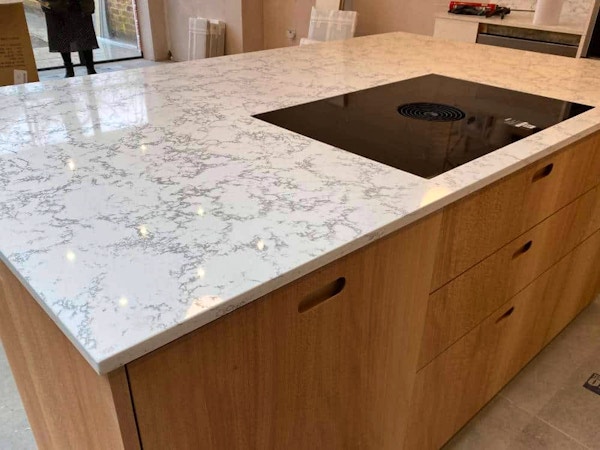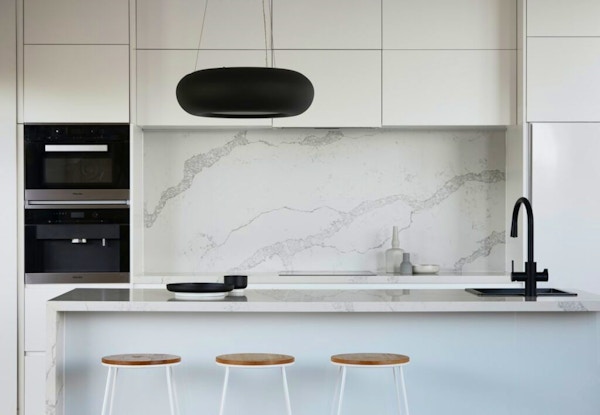What Makes a Worktop Durable?
When investing in a kitchen worktop, durability is one of the most important factors. A high-quality worktop should withstand daily use, resist damage, and maintain its appearance over time. Several factors influence how long a worktop lasts, from material composition to maintenance requirements.
The most durable worktops are made from materials that resist heat, scratches, and stains. Natural stone options like granite and engineered surfaces such as quartz are highly resilient, while solid surface materials like Corian, Tristone, and Minerva offer seamless finishes with repairable surfaces.

Maintenance plays a crucial role in longevity. Some materials require regular sealing to prevent stains, while others, like quartz, need minimal upkeep. Additionally, proper installation ensures the worktop remains stable and prevents issues like cracking or water damage. Choosing a worktop that balances strength, maintenance needs, and aesthetic appeal is key to long-term performance.
Granite: A Natural Choice for Long-Lasting Worktops
Granite is one of the most durable worktop materials available, prized for its natural strength and resistance to damage. As a hard-wearing stone, it withstands daily wear and tear exceptionally well, making it a popular choice for busy kitchens.
One of granite’s biggest advantages is its resistance to heat. Unlike some materials that can scorch or warp under high temperatures, granite can tolerate hot pans without damage. It’s also highly scratch-resistant, ensuring that everyday use won’t easily wear down its surface. However, using chopping boards is still recommended to maintain its finish.
While granite is naturally stain-resistant, it is a porous material, meaning it requires periodic sealing to prevent liquids from penetrating the surface. With proper care, a granite worktop can last for decades without losing its beauty. Its combination of toughness, heat resistance, and timeless appeal makes it a long-term investment for any kitchen.
Quartz: Engineered for Durability
Quartz worktops are renowned for their durability, making them a long-lasting option for kitchens and bathrooms. Unlike natural stone, quartz is an engineered material, combining crushed quartz with resins and pigments to create a non-porous, highly resistant surface.

One of quartz’s greatest strengths is its resistance to stains and bacteria. Unlike granite, it doesn’t require sealing, making it a low-maintenance choice for busy households. Its non-porous structure prevents liquid absorption, reducing the risk of stains from coffee, wine, or oil.
Quartz is also highly resistant to scratches and chips, ensuring that everyday use won’t wear down its surface. However, while it can handle moderate heat, extreme temperatures can cause damage, so using heat-resistant mats is recommended. With minimal maintenance and exceptional durability, quartz worktops provide a long-lasting, stylish solution that retains its appearance for many years.
Solid Surface Worktops: How Do They Hold Up Over Time?
Solid surface worktops, including Corian, Tristone, Minerva, Hi-Macs, and Hanex, are known for their seamless appearance and versatility. Made from a blend of natural minerals and acrylic resins, these worktops provide a smooth, non-porous surface that is resistant to stains and easy to maintain.
One of the key advantages of solid surface materials is their ability to be repaired. Unlike natural stone, which can crack or chip irreparably, solid surfaces can be refinished and restored to their original state. Minor scratches and marks can be buffed out, making them a practical choice for long-term use.

While they are resistant to most household stains, solid surface worktops are more susceptible to heat and scratches compared to granite and quartz. Using chopping boards and heat mats will help preserve their condition. With proper care, these worktops offer durability and aesthetic appeal for years to come.
Maximising the Lifespan of Your Worktop
No matter which worktop material you choose, proper care and maintenance are essential for long-term durability. Different materials have unique requirements, but a few general practices can help extend the life of any worktop.
Regular cleaning with non-abrasive products prevents surface damage and maintains appearance. For porous materials like granite, sealing every 6–12 months helps prevent stains and moisture absorption. Quartz and solid surface worktops require less upkeep but benefit from gentle cleaning to preserve their finish.
Avoiding direct heat exposure and using chopping boards instead of cutting directly on the surface can prevent heat marks and scratches. Additionally, wiping up spills quickly—especially acidic substances like vinegar or citrus juice—helps prevent potential damage.
By following these care guidelines, you can ensure your worktop remains in excellent condition for years, keeping both its functionality and visual appeal intact.

